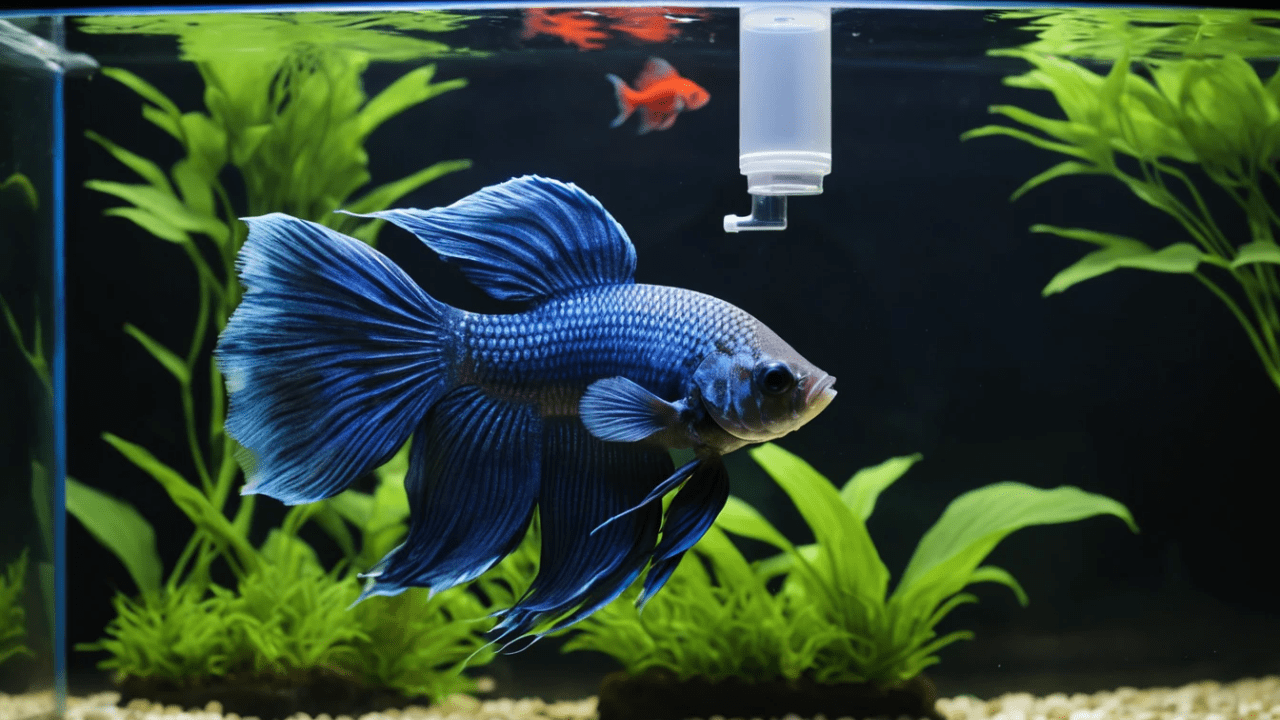Bettas are stunning, low-maintenance fish, but their environment plays a crucial role in their health and well-being. One of the most common questions betta owners ask is whether filters are safe for their fish. While bettas are known for their preference for still water, filters are essential for maintaining clean, oxygenated water. However, choosing the right filter and adjusting it to suit your betta’s needs is key.

In this article, we’ll explore whether filters can harm your betta, how to select the best one, and how to ensure your betta is comfortable and thriving in its tank.
How Can a Filter Harm Your Betta Fish?
A filter can potentially harm your betta fish if it’s too powerful or not properly adjusted. Bettas are delicate fish that prefer calm waters, and strong filter currents can stress them out, making it hard for them to swim comfortably. The intense flow from a filter can also cause injuries to a betta’s fins, especially with rough filters or overly strong suction. If the filter is set to a high flow rate, it can create an environment that is uncomfortable and unsafe for your betta, leading to stress and weakened immunity over time.
In addition to strong currents, the suction power from filters can pose a significant risk. Betta fish are small and have delicate fins, which may get caught in the intake tube or filter mechanisms if not properly protected. This could result in injuries or stress that impacts their health. That’s why it’s essential to choose a filter that matches the size of your tank and provides a gentle flow, reducing the chances of harm. Using a filter with an adjustable flow rate or a pre-filter sponge can significantly help in creating a safer environment for your betta.
The Importance of Choosing the Right Filter for Betta Fish
Choosing the right filter for your betta fish is crucial to ensuring their long-term health and well-being. Betta fish are sensitive to strong water currents, so it’s important to select a filter that provides gentle water movement. Filters with an adjustable flow rate, like HOB (Hang-On-Back) filters, allow you to control the flow to suit your betta’s needs. The correct filter will help maintain proper oxygenation and remove toxins like ammonia and nitrites, ensuring your betta thrives in a clean, healthy environment.
A filter that is too powerful for a small tank can cause your betta to become stressed and exhausted from constantly swimming against the current. Choosing a filter specifically designed for small tanks or low-flow filtration will help to provide the ideal environment for your betta fish. It’s also important to consider factors like maintenance ease and long-term cost when selecting a filter to ensure the best balance between effectiveness and convenience.
What Type of Filter is Safe for Betta Fish?
When choosing a filter for your betta fish, it’s essential to look for one that provides gentle filtration without strong currents. Sponge filters are often considered the best option for bettas, as they provide biological filtration while producing a very gentle flow. These filters are ideal for small tanks and help promote proper oxygenation without disturbing the betta’s habitat. HOB filters are also a good choice, as long as they have an adjustable flow rate, allowing you to reduce the intensity to a level that’s comfortable for your betta.
Another safe option for betta fish is a submersible filter that attaches to the side of the tank. These filters are effective in providing clean water and are typically designed to have a low flow that’s gentle enough for bettas. It’s crucial to check the specifications and choose one designed specifically for smaller, low-flow tanks to prevent creating excessive currents. Regardless of the type, the filter should be capable of maintaining clean water without compromising your betta’s comfort.
How to Prevent Filter-Related Injuries in Betta Fish
Preventing filter-related injuries in betta fish involves selecting the right type of filter and taking extra precautions to minimize any risks. Start by choosing a gentle filter with an adjustable flow rate, which allows you to control the intensity of the water movement. This ensures the filter doesn’t create strong currents that could stress or injure your betta. Additionally, using a pre-filter sponge on the intake tube can prevent the betta’s fins from being sucked in and getting injured.
It’s also essential to regularly clean and maintain the filter to ensure it works efficiently. A clogged or dirty filter can increase suction power and disrupt the flow, leading to potential injuries. Keeping a low-flow filter and monitoring your betta’s behavior is key—if your betta seems stressed or struggling to swim, it’s a sign that the filter may need adjustment. By taking these preventive steps, you can keep your betta safe from filter-related harm.
How to Adjust Filter Flow for Betta Fish Comfort
To ensure your betta fish is comfortable, it’s essential to adjust the filter flow to prevent strong currents. Many HOB filters have adjustable flow rates, allowing you to reduce the power of the current to a level that’s gentle enough for your betta. If your filter doesn’t have this feature, you can add a pre-filter sponge to the intake tube, which will slow down the water flow and reduce the suction that could harm your betta.
Alternatively, consider using a sponge filter, as it creates a mild, consistent flow that won’t disturb your betta’s natural behavior. Keep an eye on your betta’s swimming patterns and adjust the filter accordingly. If your betta struggles to swim or appears stressed, it’s a clear indicator that the current is too strong. Regularly monitoring the filter’s effectiveness and making adjustments as needed will ensure your betta enjoys a stress-free environment.
The Dangers of Overpowering Filter Flow on Betta Health
An overpowering filter flow can have serious consequences for betta fish health. Bettas are naturally found in slow-moving waters, and strong currents can be overwhelming for them. Excessive flow can lead to physical damage, such as finnage injuries or even being sucked into the filter intake. Additionally, constant stress caused by strong currents can weaken your betta’s immune system, making it more susceptible to diseases and infections.
It’s vital to use a filter that provides adequate filtration without creating an overwhelming current. Adjustable filters are ideal for bettas, as they allow you to control the flow rate and ensure the tank’s environment stays calm and safe. A low-flow filter or a sponge filter is often the best choice for bettas, as these options mimic the calm waters they prefer and provide the necessary filtration without excess stress.
Can a Filter Affect Betta Fish Behavior and Well-Being?
Yes, a filter can significantly affect your betta fish’s behavior and overall well-being. Betta fish are sensitive to water currents and may exhibit signs of stress, such as hiding, loss of appetite, or agitation if the filter flow is too strong. Over time, prolonged exposure to stressful conditions can weaken your betta’s immune system, leading to health issues like fin rot or other diseases. Additionally, excessive water flow can limit their ability to swim freely, which may cause them to be less active and engage in abnormal behaviors.
To maintain a healthy environment for your betta, choose a filter that produces a gentle flow and mimics the natural calm waters that bettas thrive in. Adjusting the flow rate or using a sponge filter can help reduce the risk of filter-related stress and ensure your betta remains happy and healthy.
Maintaining a Safe Tank Environment for Betta Fish
Maintaining a safe tank environment for your betta fish involves ensuring both the water quality and filter setup are appropriate. A common question that arises is, Can Betta Fish Live in a Bowl? While some might think bettas can thrive in small spaces like bowls, it’s essential to provide them with a larger tank with proper filtration. Regularly check the filter to ensure it’s running at the correct flow rate and isn’t causing harm to your betta. A clean tank with properly adjusted filtration ensures that your betta has a comfortable, healthy environment to thrive in.
In addition to the filter, regular water changes and monitoring water parameters—such as pH, ammonia, and nitrates—are critical for keeping the water quality in check. Consider the overall tank setup as well. Live plants, decor, and a proper substrate contribute to maintaining a natural and comfortable environment for your betta. Creating a peaceful, low-stress habitat with the right filter and water quality will help ensure your betta lives a long, happy life in a safe and healthy tank environment.
Expert Tips to Keep Your Betta Safe from Filter Hazards
- Choose a gentle, low-flow filter suitable for small tanks.
- Sponge filters are a great option, offering biological filtration and mild water movement that bettas prefer.
- Add a pre-filter sponge to the intake tube to prevent suction-related injuries.
- Regularly clean and maintain the filter to avoid creating hazardous conditions for your betta.
- Monitor your betta’s behavior for signs of stress or difficulty swimming, which may indicate the filter flow needs adjustment.
- Adjust the filter flow as necessary to ensure your betta is comfortable and healthy.
FAQs
Are filters safe for betta fish?
Yes, filters can be safe for betta fish if chosen and set up correctly. Bettas prefer calm waters, so it’s essential to choose a gentle, low-flow filter. Strong currents from powerful filters can stress your betta, cause injuries to their fins, and make it difficult for them to swim comfortably. A sponge filter or an HOB filter with adjustable flow works well for betta fish, providing clean water without strong currents. Proper filter maintenance is also important to ensure a healthy and safe environment for your betta.
Can a filter be too strong for a betta fish?
Yes, a filter can be too strong for a betta fish. Bettas are sensitive to strong water currents, and if the flow is too powerful, it can lead to stress and potential harm. A strong filter can make it difficult for a betta to swim comfortably and may cause injuries to their delicate fins. To keep your betta safe, it’s best to adjust the filter for a gentle water flow or use a pre-filter sponge or flow reducer to minimize the strength of the current. This will create a more comfortable and stress-free environment for your betta fish.
Do bettas hate filters?
No, bettas don’t hate filters. In fact, when used correctly in the right environment, a filter is beneficial for their health. It’s true that bettas don’t like strong water movement, and filters do create some current. However, there are filters available with weak or adjustable outputs that allow you to control the flow, ensuring a gentle water movement that bettas find comfortable. So, with the right filter setup, you can provide both clean water and a stress-free environment for your betta.
Conclusion
In conclusion, filters are beneficial for betta fish when used properly. While bettas don’t thrive in strong currents, choosing a gentle, low-flow filter will provide the clean, stable water they need to thrive. Adjusting the filter to reduce water movement and using pre-filter sponges can help maintain a safe, stress-free environment. With the right filter and regular maintenance, you can ensure your betta enjoys a healthy, long life in a clean and comfortable tank.
Curious about the best tank mates for your betta fish? Discover the ideal companions to keep your betta happy and stress-free in a peaceful community tank!
